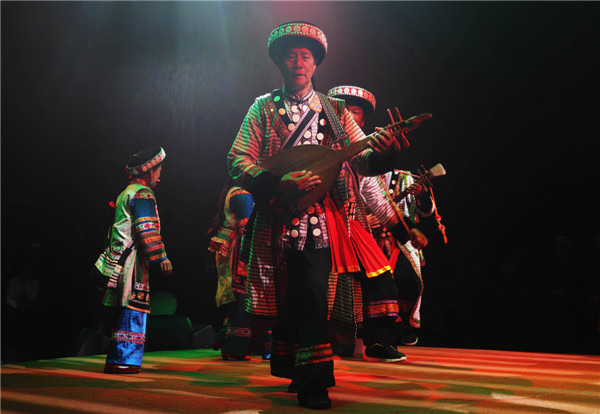

Artists from the Lisu, Blang, Lahu and Va ethnic groups performed at the Beijing Music Festival on Oct 17. The program, Walking on the Ancient Tea-Horse Road, brought art forms from eight ethnic groups of Yunnan province to audiences. Photos by Jiang Dong/China Daily
Performances by indigenous musicians from Yunnan give a new flavor to the Beijing Music Festival.
At 52, A Benzhi can still clearly recall images of his father getting up before sunrise to work on the farm and returning home after sunset every day over four decades ago.
Beyond that diligence, what lingers in A's memory is his father's singing of Meng Hua Diao, or Menghua melody, the oldest music of the Yi ethnic group performed in local dialect. Menghua is the old name of Nanjian county, where A Benzhi lives.
"My father sang those songs all the time. He was a good man and he loved those songs. Even in his last days, he murmured the melodies lightly until he passed away at 70," recalls A Benzhi, who was born in a small village of Nanjian Yi autonomous county in the Dali area of Yunnan province. The Yi people have lived there for generations.
He followed in his father's footsteps to learn the art form of Menghua. He also started collecting traditional Yi music after he graduated from high school in 1978.
As the most educated man in his village then, A Benzhi worked as a clerk in a cultural center before he began devoting all his time to protecting Yi music in 1984.
In a recent concert held at Taikoo Li Sanlitun, a trendy shopping area in downtown Beijing, he performed Menghua songs.
"This place is wonderful, this road is crowded, I wish to marry a girl from here and make her part of my family," he sang in Yi dialect with videos of his village scenery displayed on the screens behind. The bearded and bald man wore a long sleeveless jacket made of sheepskin, open to show his bare chest, and a pair of loose black pants. His handmade embroidered belt was tied around his big belly.
Most of the audience didn't understand Yi dialect, so they listened to the songs as if hearing a foreign language. But they cheered and applauded the vibrant rhythm and the singer's powerful voice. His performance included songs for wedding ceremonies that were accompanied by bamboo flutes, reed pipes and lutes.
As one of the programs of the Beijing Music Festival, the concert, titled Walking on the Ancient Tea-Horse Road, also brought artists from eight other ethnic groups of Yunnan province, including the Blang, Va and Bai.
The event was a part of an effort by Hou Dudu, 40, who worked as a violist in the symphony orchestra of the National Ballet of China for seven years after his graduation from the Central Conservatory of Music. In 2009, Hou quit his job and started traveling around the country, collecting music from China's ethnic groups. By early this year, he finished the project, successfully visiting all 56 ethnic groups of China.
Chinese song contest held in Russia‘s St. Petersburg
2014-10-27Copyright ©1999-2018
Chinanews.com. All rights reserved.
Reproduction in whole or in part without permission is prohibited.